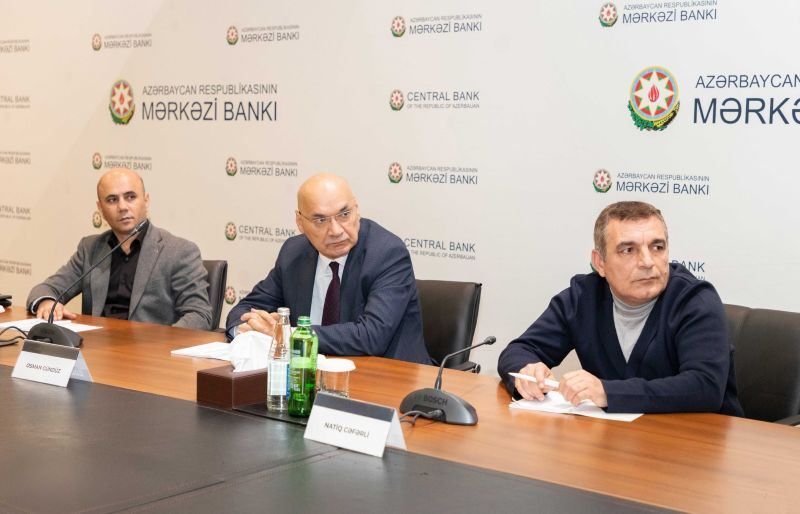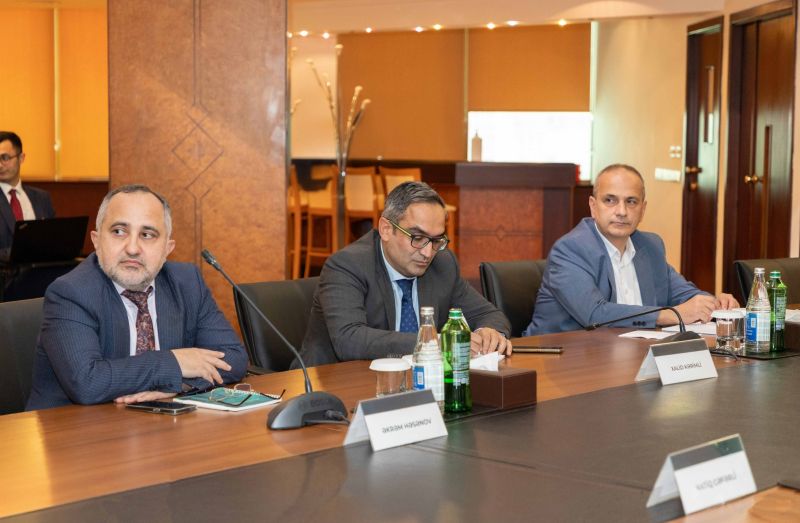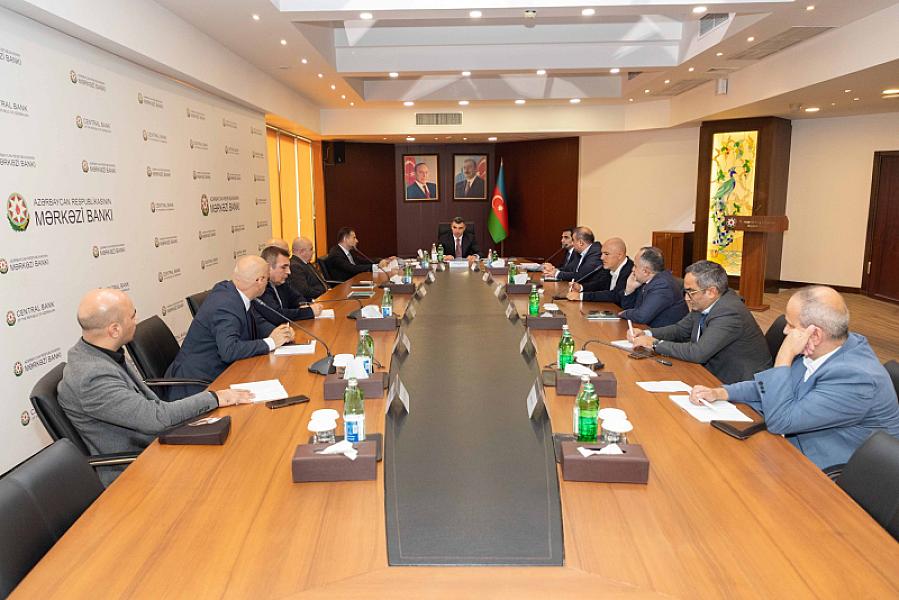On October 22, the Central Bank held another meeting between its chairman Taleh Kazimov and experts.
During the meeting, discussions were held on monetary-credit policy, supervision and regulatory frameworks, the development dynamics of the financial sector, as well as current issues of central banking.
The Central Bank stated that the regular exchange of views and bilateral dialogue with experts significantly contributes to the proper formation of public opinion, thereby enabling the Central Bank’s decisions to be communicated to the public and partners more fully and transparently.
Medianews.az reports that experts Natiq Jafarli and Akram Hasanov, who participated in the meeting, shared their thoughts on social media regarding the matter.

Natiq Jafarli wrote:
“On October 22, at the invitation of the Central Bank’s leader, esteemed Taleh Kazimov, I participated in a meeting at the Central Bank with a group of economists. First, I want to note that the meeting of such an important state institution like the Central Bank with experts has already become a tradition, and this should serve as an example for other government institutions as well.
The meeting, which lasted nearly 3 hours, involved open discussions on various issues. Many of the problems raised by my colleagues were related to the government's work, exceeding the Central Bank’s authority; however, since government institutions avoid open conversations, we had to express our grievances to the state institution.
There were two important issues for me, which I’ll mention:
1) Taleh Kazimov stated that personally he and the state institution he leads are in favor of modifying the 200,000 turnover limit established in 2006 for small entrepreneurs, which has persistently not been changed. Now, when a small entrepreneur's turnover exceeds 200,000, the ‘glorious’ tax authorities involve them in VAT, turning them into payers of the 18% value-added tax. This is incorrect; the 200,000 figure is too low and should be at least 500,000 manat. If you recall, I have raised this problem for years, trying to support small entrepreneurs, and it was good to see that Teacher Taleh holds the same position.
2) The Central Bank is concerned about the low GDP growth rate and rising inflation in the country, but cannot actively address these problems with the tools it has. I would also add that the current economic system is so primitive that it limits the Central Bank’s regulatory capabilities through economic instruments. Therefore, logically, fundamental reforms are needed in the economic system so that the Central Bank can effectively perform its regulatory functions.
Finally, I will say that the Central Bank is open to criticism and proposals, which is an approach to be appreciated, but the issue is that the Central Bank, as a state institution, should itself become an internal critic of the government within the system; unfortunately, this has not yet happened...”

Akram Hasanov wrote:
“As always, Taleh Kazimov gave thorough and sincere answers to all questions in an open and constructive discussion (sometimes even debate). This time, the main topics were monetary policy and venture financing. It also became clear that Teacher Taleh participates last in the voting in the collegial bodies of the Central Bank (Monetary Policy and Financial Stability Committee) to ensure genuine collegiality, and he has even voted against some of the adopted decisions. This is a very good example for other state institutions!
My question was about one of the most important issues for the banking system – deposits. It is known that banks are interested in long-term deposits. However, currently, one bank – ‘Turanbank’ – creates a danger for long-term deposits. That is, a customer deposited 100,000 dollars in this bank in 2009 and passed away three years later. Only now did the son find the deposit contract and the receipt (as well as a land ownership document) among the documents and went to a notary. However, ‘Turanbank’ claims that the depositor withdrew his deposit back in 2010. How does the bank prove this? It doesn’t! It says it destroyed all related documents in 2016 because, according to the Central Bank’s rules, documents must be kept for at least 5 years; after 5 years, it destroyed them.
In other words, ‘Turanbank’ implies that keeping deposits in our banks for more than 5 years is very risky. Because if you come after 5 years to claim your deposit, the bank might say you withdrew it the very next day and has destroyed the documents after the 5 years passed. Nothing can pose a bigger threat to the banking system than this: creating uncertainty for depositors! You can apply to Swiss banks and withdraw your money even after a century, but our one bank harms the entire banking system’s reputation by showing such an absurd stance.
The problem is that this position is conveyed in writing not by an ordinary bank employee but by the chairman of the board of the bank. It is dreadful! Until now, the bank does not know that the Central Bank’s requirements apply solely to banks, not customers. When the Central Bank says to keep documents for at least 5 years, it means that during an audit, 5 years’ worth of documents may be requested. But of course, the bank itself needs to keep the document confirming its fulfillment of obligations towards the customer primarily because the burden of proof for returning the deposit lies with it.
The chief banker said the issue will be investigated and confirmed that the Central Bank’s requirements apply solely to banks, not customers. I hope such cases do not exist in other banks and that only at ‘Turanbank’ is it risky to keep money for more than 5 years. But how can we be sure? One bank can disgrace the entire banking system...”

